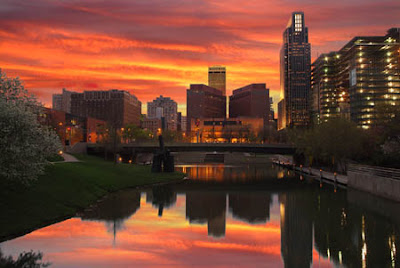This week, we're talking about the relationship between the reader and the text. I'm gonna take the easy-yet-direct route of answering the questions Jeff posted.
1) Who should we be when we encounter texts?
Whenever we approach text, we enter the reading in a specific state of mind, having certain expectations beforehand. Maybe our expectations are simply that we are going to be open minded about the book, but something about this text has put the idea into our mind to specifically consider our open-mindedness to it. This is one scope to interpret text through, however, there are often more effective ways to do so.
Thinking about the author's point of view is often informative of the text itself. If you approach something without any clue as to the author's background, you may get an entirely different story. An example of this in the art world is
"Untitled (Portrait of Ross in L.A.)" by Felix Gonzalez-Torres.
When you first approach this piece, it seems like some kind of amusing statement or childlike whimsy created by the light which dances off of the multi-colored foil wrappers containing tiny, succulent moments of sweetness and nostalgia. You may stand back and think, "Okay, someone dumped candy in the corner. What does that have to do with anything?"
Once you know the back story of Felix Gonzalez-Torres, this piece becomes a touching, beautiful memorial. Ross, his partner, is represented by this pile of candy. The candy weighs 175 pounds, Ross's ideal body weight. Viewers of the exhibit are encouraged to take the candy, and throughout the day the exhibit withers away. The same occurred in real life of Ross's body due to the ravaging of A.I.D.S. This creates a connection between the consumer and the consuming nature of the disease, along with other tangents such as this.
If you weren't familiar with this artist, you might pass by this installation without a second thought.
Another important way to regard the text is as the author's intended audience. Each text has some kind of intended audience. If the audience is not receiving the output broadcasted by the author the way they intended it to, the text is ineffective, and arguably worthless. The writer should step back from their work and read it while considering what they, as a reader, would want to be drawing from this reading. The author must then make a choice, as to give the reader what they want or to keep them wanting.
If you write informative text (like a science magazine) and you don't tell the reader what they need to know, you are likely a bit dense. On the reverse side, if you are writing a novel to create a story and take a reader on a journey, leaving nothing left to the imagination makes for a truly dull read.
2) What are we after when we encounter texts?
Approaching each piece of information we decide to read, we have decided to read it for some reason. Sometimes we are simply looking to learn factual information, and may pick up an encyclopedia or trusted article source. We are often seeking entertainment, though. Even in finding factual information, if we can do so while being entertained, we would prefer this. However, most entertainment text sources are purely that: entertainment. In this we often seek familiarity and excitement.
3) What should we bring to the table when we interrogate texts?
When you are really looking at a text and breaking it down, you should offer a new viewpoint on it or elaborate on an existing one in a new way. The center of knowledge is adaptability, in that the more unique ways you can think about something and share it, the more opportunities other people have to take that idea and either discount it (and explain why) or jump off of it and elaborate upon it. Using references and sources to explain your idea is helpful to convey it, along with adding credibility. Lord knows anyone can spout off about anything on the internet these days.
4) What questions shall we be asking about texts?
I think considering the following in each post will influence posting meaningful comments in return:
Why does this matter?
Where/who did this concept come from?
What/who does this concept influence?
What new ideas does this concept inspire?
Does this concept have any potential for growth?
5) Are there any questions that aren't kosher to post about text?
I think that as long as posters maintain a level of respect and thoughtfulness, no question is out of bounds. If things get too personal, I could see cutting off a thread, but it is a responsibility of the author to understand questions which may arise from the things they post and to be prepared to deal with or answer them. It would also be counterproductive to ask questions which are obvious shit-flingers, such as, "How stupid could you possibly be to think this post is of interest?"
The attached article is fairly long and dense, but makes some interesting points if you want to check it out.
On that note, I think I'll leave this post for you all to respond to now.
See you in class tomorrow, folks :]







